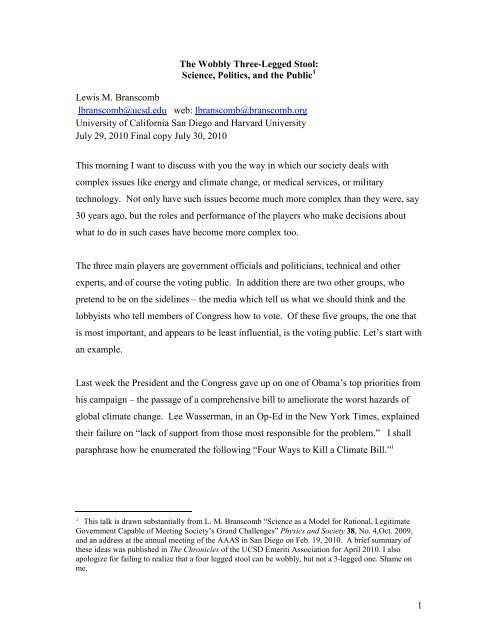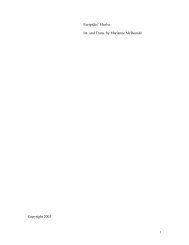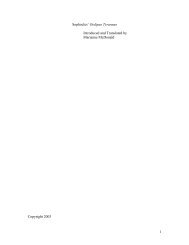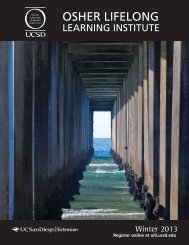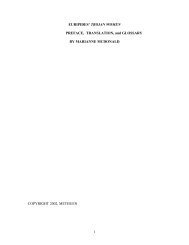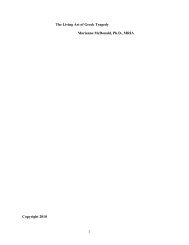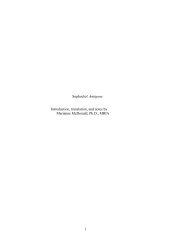1 The Wobbly Three-Legged Stool: Science, Politics, and the Public ...
1 The Wobbly Three-Legged Stool: Science, Politics, and the Public ...
1 The Wobbly Three-Legged Stool: Science, Politics, and the Public ...
You also want an ePaper? Increase the reach of your titles
YUMPU automatically turns print PDFs into web optimized ePapers that Google loves.
<strong>The</strong> <strong>Wobbly</strong> <strong>Three</strong>-<strong>Legged</strong> <strong>Stool</strong>:<br />
<strong>Science</strong>, <strong>Politics</strong>, <strong>and</strong> <strong>the</strong> <strong>Public</strong> 1<br />
Lewis M. Branscomb<br />
lbranscomb@ucsd.edu web: lbranscomb@branscomb.org<br />
University of California San Diego <strong>and</strong> Harvard University<br />
July 29, 2010 Final copy July 30, 2010<br />
This morning I want to discuss with you <strong>the</strong> way in which our society deals with<br />
complex issues like energy <strong>and</strong> climate change, or medical services, or military<br />
technology. Not only have such issues become much more complex than <strong>the</strong>y were, say<br />
30 years ago, but <strong>the</strong> roles <strong>and</strong> performance of <strong>the</strong> players who make decisions about<br />
what to do in such cases have become more complex too.<br />
<strong>The</strong> three main players are government officials <strong>and</strong> politicians, technical <strong>and</strong> o<strong>the</strong>r<br />
experts, <strong>and</strong> of course <strong>the</strong> voting public. In addition <strong>the</strong>re are two o<strong>the</strong>r groups, who<br />
pretend to be on <strong>the</strong> sidelines – <strong>the</strong> media which tell us what we should think <strong>and</strong> <strong>the</strong><br />
lobbyists who tell members of Congress how to vote. Of <strong>the</strong>se five groups, <strong>the</strong> one that<br />
is most important, <strong>and</strong> appears to be least influential, is <strong>the</strong> voting public. Let’s start with<br />
an example.<br />
Last week <strong>the</strong> President <strong>and</strong> <strong>the</strong> Congress gave up on one of Obama’s top priorities from<br />
his campaign – <strong>the</strong> passage of a comprehensive bill to ameliorate <strong>the</strong> worst hazards of<br />
global climate change. Lee Wasserman, in an Op-Ed in <strong>the</strong> New York Times, explained<br />
<strong>the</strong>ir failure on “lack of support from those most responsible for <strong>the</strong> problem.” I shall<br />
paraphrase how he enumerated <strong>the</strong> following “Four Ways to Kill a Climate Bill.” i<br />
1 This talk is drawn substantially from L. M. Branscomb “<strong>Science</strong> as a Model for Rational, Legitimate<br />
Government Capable of Meeting Society’s Gr<strong>and</strong> Challenges” Physics <strong>and</strong> Society 38, No. 4,Oct. 2009,<br />
<strong>and</strong> an address at <strong>the</strong> annual meeting of <strong>the</strong> AAAS in San Diego on Feb. 19, 2010. A brief summary of<br />
<strong>the</strong>se ideas was published in <strong>The</strong> Chronicles of <strong>the</strong> UCSD Emeriti Association for April 2010. I also<br />
apologize for failing to realize that a four legged stool can be wobbly, but not a 3-legged one. Shame on<br />
me.<br />
1
1) Since <strong>the</strong> economy is most pressing in <strong>the</strong> public’s mind, <strong>and</strong> climate is a<br />
complicated <strong>and</strong> long range issue, <strong>the</strong> administration made little effort to explain <strong>the</strong><br />
urgency of climate change to <strong>the</strong> public.<br />
2) <strong>The</strong> conventional wisdom of <strong>the</strong> Beltway lobbyists is that you must first persuade <strong>the</strong><br />
industry that most contributes to climate change that it must accept an effective but<br />
costly legislative program.<br />
3) This meant that Congress would create a bill crammed with complex policy<br />
provisions to satisfy each affected industry. <strong>The</strong> bill Congress actually developed<br />
contained pollution allowances for favored industries, <strong>and</strong> international provisions<br />
that would avoid having to reduce greenhouse gas emissions here at home. <strong>The</strong> bill<br />
also included carbon credit default swaps. Campbell Soup even dem<strong>and</strong>ed “a special<br />
deal for <strong>the</strong> carbon-intensive job of making chicken noodle soup.”<br />
4) Fourth was <strong>the</strong> basic source of <strong>the</strong> government’s failure to address <strong>the</strong> problem<br />
seriously: Wasserman’s heading: “<strong>The</strong> <strong>Public</strong> Sits it Out.”<br />
Let me quote Wasserman:<br />
“American history has few examples of Presidents or Congresses upending<br />
entrenched interests without public pressure forcing <strong>the</strong>ir h<strong>and</strong>. Teddy Roosevelt is on<br />
Mount Rushmore for a reason. Citizens wouldn’t support an approach <strong>the</strong>y couldn’t<br />
underst<strong>and</strong>, to solve a problem our leaders refused to acknowledge. Even <strong>the</strong> earth’s<br />
flagging ability to support life as we know it couldn’t stir a public outcry. <strong>The</strong> loudest<br />
voices insisted that leaders in Washington do nothing. <strong>The</strong>y obliged.”<br />
But how well informed is that public that sat out <strong>the</strong> political debate over climate change<br />
legislation?<br />
<strong>The</strong> <strong>Public</strong> Agenda, a non-profit research organization founded in 1975 by Daniel<br />
Yankelovich <strong>and</strong> Cyrus Vance, has been studying what <strong>the</strong> public knows <strong>and</strong> thinks<br />
about energy <strong>and</strong> climate policy.<br />
2
<strong>The</strong>ir study was described by <strong>Public</strong> Agenda Sr. VP Jean Johnson at <strong>the</strong> annual AAAS<br />
meeting in San Diego last February. She <strong>and</strong> Dan both argued that <strong>the</strong> conventional idea<br />
that we only need an “informed public” to get good policies is deceptive. In <strong>the</strong> case of<br />
climate, for example, experts, with <strong>the</strong> aid of media, have been telling <strong>the</strong> public for a<br />
long time about <strong>the</strong> urgency of climate change <strong>and</strong> <strong>the</strong> dangers of energy import<br />
dependence. Thirty years ago, in 1979, <strong>the</strong> best science authority in <strong>the</strong> country, <strong>the</strong><br />
National Academy of <strong>Science</strong>s, reported that global warming was highly credible. Every<br />
year since, <strong>the</strong>re have been important voices telling <strong>the</strong> public this is a serious issue.<br />
Remember <strong>the</strong> Kyoto Protocol, <strong>the</strong> first IPCC report ii in 1990, Al Gore’s movie <strong>and</strong><br />
Nobel prize, <strong>and</strong> last year EPA found carbon emissions in <strong>the</strong> atmosphere hazardous<br />
under <strong>the</strong> Clean Air Act.<br />
Despite all this public information, 4 in 10 Americans cannot even name a fossil fuel. 6<br />
in 10 cannot name a renewable energy source. Fifty-six percent believe nuclear energy<br />
causes global warming. Thirty-two percent even believe solar energy causes global<br />
warming.<br />
And despite all this public information , <strong>the</strong> message sent is not <strong>the</strong> message received.<br />
<strong>Science</strong> is telling us that climate change is one of <strong>the</strong> greatest threats facing humanity.<br />
What <strong>the</strong> public hears is increases in gas prices. Dependence on foreign oil worries 60%<br />
of Americans, while only 32% worry about global warming.<br />
Some key information has been absorbed. <strong>The</strong> majority of Americans recognize that<br />
driving cars does contribute a lot to global warming. An even larger percentage<br />
recognizes that dependence on foreign oil is an economic issue <strong>and</strong> could result in higher<br />
oil prices. But <strong>the</strong> public is still thinking wishfully <strong>and</strong> rejects many of <strong>the</strong> warnings of<br />
key experts. <strong>The</strong>y like to blame oil prices on speculators <strong>and</strong> believe <strong>the</strong> US has more<br />
than 10% of world oil reserves (really it is 2.4%).<br />
3
Could it be, <strong>the</strong>n, that lack of underst<strong>and</strong>ing of <strong>the</strong> most basic relevant technical facts is<br />
at least in part responsible for public unwillingness to accept any policy that increases<br />
<strong>the</strong> cost of driving? <strong>The</strong> public worries about gas prices even though nearly seven in 10<br />
say <strong>the</strong>y want <strong>the</strong> nation to “take steps to gain energy independence even if it raises<br />
costs?” Perhaps <strong>the</strong>y are thinking about someone else’s costs when <strong>the</strong>y answered that<br />
question.<br />
<strong>The</strong> scientific community holds itself somewhat responsible for <strong>the</strong> public’s lack of<br />
comprehension of <strong>the</strong> well-established facts underlying sensible public policies. We<br />
scientists tend to believe that rational government depends on <strong>the</strong> scientists’ ability to<br />
give good advice to <strong>the</strong> politicians. If <strong>the</strong> politicians don’t accept our advice, we blame<br />
<strong>the</strong>m. We don’t blame <strong>the</strong> public for not convincing politicians that our science advice<br />
should be listened to. Or, some of us hope that supporting well-intentioned programs of<br />
“public science literacy” or “public underst<strong>and</strong>ing of science” will somehow make up<br />
for <strong>the</strong> public’s ability to underst<strong>and</strong> <strong>the</strong> trade-offs between short term costs <strong>and</strong> long<br />
term benefits of important policy issues.<br />
<strong>Science</strong> cannot rely on telling <strong>the</strong> public what we think <strong>the</strong>y need to know about math,<br />
physics, chemistry <strong>and</strong> biology, much less how we think <strong>the</strong>y should vote. Indeed Dan<br />
Yankelovich <strong>and</strong> Jean Johnson agree that providing information to <strong>the</strong> public – telling<br />
<strong>the</strong>m <strong>the</strong> facts, so to speak -- is not <strong>the</strong> answer ei<strong>the</strong>r. <strong>The</strong>y argue that scientist must be<br />
explainers, not teachers, <strong>and</strong> not advocates. <strong>The</strong>y see that <strong>the</strong> path to more sophisticated<br />
voters is not more information but is a process of public opinion making that is complex,<br />
time consuming, <strong>and</strong> incorporates many elements o<strong>the</strong>r than exposure to facts.<br />
Dan describes this process as involving three stages of development, which may take<br />
months or years, even decades. <strong>The</strong> first stage is consciousness raising, where <strong>the</strong> media<br />
have an important role. <strong>The</strong> second stage he calls “working through”. Here leadership<br />
<strong>and</strong> choices are essential. <strong>The</strong> third stage is resolution of conflicting view, where <strong>the</strong><br />
political system must come to a conclusion. Yankelovich <strong>and</strong> Johnson call <strong>the</strong>se three<br />
steps <strong>the</strong> “<strong>Public</strong>’s Learning Curve” in contrast to <strong>the</strong> static image of an “informed<br />
public.”<br />
4
<strong>The</strong> most time consuming <strong>and</strong> difficult of <strong>the</strong> three stages is <strong>the</strong> second, or “working<br />
through” stage. This stage is <strong>the</strong> least compatible with American culture. Here<br />
information is, of course, necessary, but <strong>the</strong> public is also engaged with values-based<br />
choices, wishful thinking, questions of who is included in <strong>the</strong> process <strong>and</strong> whom to<br />
believe. In addition, <strong>the</strong> public must cope with distractions, with denial, <strong>and</strong> lack of<br />
background <strong>and</strong> context. Dealing with statistical likelihood <strong>and</strong> o<strong>the</strong>r technical concepts<br />
is often difficult. And when <strong>the</strong> scientists disagree among <strong>the</strong>mselves, <strong>the</strong> public<br />
becomes disoriented.<br />
Given <strong>the</strong> sad state of public education in science <strong>and</strong> ma<strong>the</strong>matics, <strong>the</strong> technical<br />
community <strong>and</strong> government must become more skilled at explaining those elements of<br />
scientific knowledge that are relevant to addressing <strong>the</strong> issues <strong>the</strong> public cares about.<br />
And when discussing policy issues such as energy <strong>and</strong> climate change, both scientists<br />
<strong>and</strong> politicians must underst<strong>and</strong> how <strong>the</strong> public goes about making up its collective mind.<br />
This is very important. But even more important is <strong>the</strong> goal of competent governance<br />
<strong>and</strong> good policy decisions. <strong>The</strong> stability <strong>and</strong> sound functioning of our democracy is at<br />
stake.<br />
<strong>The</strong> Constitution was designed on a set of assumptions about how <strong>the</strong> people would<br />
ensure wise governance in <strong>the</strong> absence of a monarch or autocrat running <strong>the</strong> country. In<br />
short <strong>the</strong> people must be able to govern <strong>the</strong>mselves. <strong>The</strong> expectations of <strong>the</strong><br />
Constitution’s authors have seriously eroded over <strong>the</strong> years, <strong>and</strong> especially in <strong>the</strong> last<br />
decade.<br />
Let’s go back <strong>and</strong> take a quick look at that history. We need to underst<strong>and</strong> <strong>the</strong> extent to<br />
which <strong>the</strong> rational behavior of our government does, indeed, depend on <strong>the</strong> role that<br />
science played in <strong>the</strong> thinking of <strong>the</strong> “founding fa<strong>the</strong>rs.” <strong>The</strong>ir concern was how <strong>the</strong>ir<br />
new political invention would shield <strong>the</strong> people from autocracy <strong>and</strong> become legitimate<br />
<strong>and</strong> effective in <strong>the</strong> eyes of <strong>the</strong> voters. That is why <strong>the</strong>y built checks <strong>and</strong> balances into<br />
<strong>the</strong> tripartite structure of <strong>the</strong> government.<br />
5
Both American democracy <strong>and</strong> modern science are products of <strong>the</strong> Enlightenment, with<br />
its emphasis on reason <strong>and</strong> openness, ra<strong>the</strong>r than on religious <strong>and</strong> political authority. 2<br />
<strong>The</strong> Founders constructed an arranged marriage between two partners -- rational citizens<br />
<strong>and</strong> politicians – who would be dependent on one ano<strong>the</strong>r, but for motives that are quite<br />
different <strong>and</strong> to some degree conflicting. For rational citizens, educated during <strong>the</strong><br />
Enlightenment, <strong>the</strong>ir model was <strong>the</strong> extraordinary achievements of 18 th century science<br />
<strong>and</strong> philosophy. American democracy has always benefited from a pragmatic<br />
willingness to learn from experience, very much as science relies on experiment.<br />
Progress in science is based on transparency, accountability, <strong>and</strong> trust. <strong>The</strong>se are also<br />
basic principles of sustainable democratic government. Thus if science <strong>and</strong> democracy<br />
are both to flourish, government must be pragmatic, open, <strong>and</strong> viewed by <strong>the</strong> voters as<br />
legitimate <strong>and</strong> responsive to voter desires. If science is corrupted by government,<br />
government itself is in danger of becoming corrupt. And conversely, when government<br />
allows itself to become corrupt, science advice is sure to suffer as well.<br />
Ensuring that not only our science, but also our politicians are transparent in <strong>the</strong>ir<br />
government work, accountable for <strong>the</strong> consequences of <strong>the</strong>ir decisions, <strong>and</strong> trustworthy<br />
in what <strong>the</strong>y say <strong>and</strong> do, requires more concerted effort than <strong>the</strong> Founders ever thought<br />
might be required.<br />
Authors of <strong>the</strong> Constitution could not have anticipated <strong>the</strong> inevitability of universal<br />
suffrage. In <strong>the</strong>ir day, <strong>the</strong> voters were propertied, white men like <strong>the</strong>mselves -- a small,<br />
mostly well-educated, elite fraction of <strong>the</strong> population. <strong>The</strong> electorate today is not only<br />
comprised of all <strong>the</strong> nation’s citizenry, but <strong>the</strong>se voters learn about issues <strong>and</strong> make<br />
decisions in <strong>the</strong> more diffuse way that Yankelovich <strong>and</strong> Johnson describe.<br />
2 Kurt Gottfried <strong>and</strong> Harold Varmus, “<strong>The</strong> Enlightenment /returns” <strong>Science</strong> (guest editorial) Vol 323, p.<br />
1538, 20 March 2009. See also <strong>The</strong> Descent of Icarus by Yaron Ezrahi, Cambridge MA: Harvard<br />
University Press, 1990.<br />
6
In our democracy, <strong>the</strong> relationship between science <strong>and</strong> politics has never been easy, but<br />
in <strong>the</strong> minds of <strong>the</strong> drafters of <strong>the</strong> Constitution, it was always important. <strong>The</strong> search for<br />
truth in science <strong>and</strong> for legitimacy in politics both require systems for generating trust,<br />
but <strong>the</strong>se systems are not <strong>the</strong> same. Indeed, as already noted, <strong>the</strong>y are often<br />
incompatible. <strong>The</strong> most profound area of mismatch between science <strong>and</strong> politics comes<br />
down to <strong>the</strong> conflict between rational political judgments based on facts established by<br />
professional scientists, economists <strong>and</strong> o<strong>the</strong>r experts, <strong>and</strong> political interests<br />
communicated to <strong>the</strong> politicians by lobbyists <strong>and</strong> by <strong>the</strong>ir own roots <strong>and</strong> ideologies. <strong>The</strong><br />
financial support from lobbyists seems often a more effective way to assure <strong>the</strong>ir re-<br />
election than <strong>the</strong> confidence of <strong>the</strong> voting constituents in <strong>the</strong>ir good judgment . 3<br />
Both democracy <strong>and</strong> science st<strong>and</strong> to benefit enormously when our political leaders<br />
underst<strong>and</strong> that <strong>the</strong> traditions of science <strong>and</strong> <strong>the</strong> mechanics of democracy have common<br />
roots.<br />
If <strong>the</strong> voters are ignorant of <strong>the</strong> relevant technical issues, how can <strong>the</strong>y evaluate <strong>the</strong><br />
performance of government officials? And if <strong>the</strong>y cannot judge <strong>the</strong> politicians’<br />
performance intelligently, how can <strong>the</strong>y establish <strong>the</strong> legitimacy of <strong>the</strong>ir governance? If<br />
public attitudes are not founded on sound knowledge, but are only guided by <strong>the</strong>ir values,<br />
belief systems, world views <strong>and</strong> emotions, those beliefs will guide <strong>the</strong>ir views. Lobbyists<br />
<strong>and</strong> <strong>the</strong>ir sponsors will <strong>the</strong>n find it easier to leverage those public attitudes by distorting<br />
<strong>the</strong> facts. <strong>The</strong>ir interests, as we see too often, may carry <strong>the</strong> day. <strong>Science</strong> must, <strong>the</strong>refore,<br />
not only give wise advice to government, but must also find a way to share with <strong>the</strong><br />
public <strong>the</strong>ir underst<strong>and</strong>ing of <strong>the</strong> factual basis for policy choices.<br />
Thus if we are to preserve <strong>the</strong> legitimate <strong>and</strong> accountable system of government<br />
envisioned by <strong>the</strong> authors of <strong>the</strong> Constitution, <strong>and</strong> enjoy <strong>the</strong> fruits of an intelligent,<br />
informed society, government must be responsive to a sophisticated voting public, <strong>and</strong><br />
3 I use “lobbyist” to mean those whose sponsors provide generous funds with which to influence<br />
politicians by supporting <strong>the</strong>ir re-elections. I distinguish <strong>the</strong>m from <strong>the</strong> many advocates who represent<br />
organizations, usually not-for-profits, who are not in a position to contribute funds to politicians.<br />
7
science (<strong>and</strong> <strong>the</strong> media) must more effectively share with <strong>the</strong> public what <strong>the</strong>y know <strong>and</strong><br />
how <strong>the</strong>y know it.<br />
In short, our original system of governance, in which <strong>the</strong> legitimacy of government<br />
depended on a small, elite of voters, is slowly but steadily morphing into a dysfunctional<br />
democracy, in which <strong>the</strong> full span of eligible voters is insufficiently well informed <strong>and</strong><br />
motivated to hold those who govern to <strong>the</strong> requirements of transparency, trust <strong>and</strong><br />
effectiveness.<br />
In recent years, we seemed to have been going down that treacherous path. During <strong>the</strong><br />
2008 political campaign, presidential-c<strong>and</strong>idate Obama promised to reverse that trend.<br />
Many political observers of <strong>the</strong> campaign, including Dan Yankelovich, spoke often of<br />
“new pragmatism” as Obama’s guiding principle for governance. As President, Obama<br />
got off to a very good start, having appointed exceptionally well-qualified scientists to<br />
top posts in his government, promising to make decisions based on <strong>the</strong> best expert<br />
assessment of relevant facts. His governance was to be rational, pragmatic, <strong>and</strong><br />
transparent.<br />
He has not found this promise easy to fulfill.<br />
Thus, sound policy <strong>and</strong> accountable democratic governance depends on a triangle<br />
comprised of political institutions, <strong>the</strong> community of experts, <strong>and</strong> <strong>the</strong> voting public. This<br />
is <strong>the</strong> wobbly, three-legged stool. <strong>The</strong> scientists’ mistrust of politicians is reciprocated.<br />
<strong>The</strong> politicians, aware than <strong>the</strong> public is easily confused by technical arguments, fall<br />
back on <strong>the</strong>ir ideological biases <strong>and</strong> <strong>the</strong>ir sources of campaign funds. Instead of relying<br />
on <strong>the</strong> public’s trust, earned by <strong>the</strong>ir demonstration of transparent governance <strong>and</strong><br />
effective decisions, <strong>the</strong>y increasingly rely on <strong>the</strong> money <strong>and</strong> influence of lobbyists who<br />
represent an economic <strong>and</strong> power elite, <strong>and</strong> who do not see <strong>the</strong>mselves accountable to<br />
<strong>the</strong> public.<br />
8
<strong>The</strong> public has a lower regard for <strong>the</strong> Congress than <strong>the</strong>y do for used car salesmen. That<br />
leg of <strong>the</strong> triangle is wobbly enough. But <strong>the</strong> scientists’ engagement with <strong>the</strong> voting<br />
public leg of that triangle is particularly weak, despite many well intended efforts. That<br />
role – preparing <strong>the</strong> public for judging <strong>the</strong> performance of those who govern <strong>the</strong>m --<br />
has been largely left to a fourth player, <strong>the</strong> media.<br />
How well do <strong>the</strong> media help <strong>the</strong> public learn what <strong>the</strong>y need to know from science <strong>and</strong><br />
how to use that knowledge to exp<strong>and</strong> <strong>the</strong> quality of political governance? As Dan<br />
Yankelovich points out, media may do a reasonable job of “consciousness-raising” about<br />
what <strong>the</strong> public issues <strong>and</strong> are eager to cover <strong>the</strong> final disputes over what outcomes may<br />
result. But <strong>the</strong> second stage, “working through those issues,” is where most of <strong>the</strong><br />
media fall short. This is <strong>the</strong> stage where sorting out <strong>the</strong> facts <strong>and</strong> <strong>the</strong> evidence <strong>the</strong>y rest<br />
on, is most important. Thus <strong>the</strong>re are weaknesses in all three legs of <strong>the</strong> wobbly triangle.<br />
<strong>The</strong> media do not adequately compensate for <strong>the</strong> weakness in <strong>the</strong> relations between<br />
science <strong>and</strong> <strong>the</strong> public or between science <strong>and</strong> politics.<br />
Indeed, <strong>the</strong> media are increasingly merged into conglomerate business enterprises or<br />
fragmented into ideologically specialized TV channels or Internet blogs. Some, like our<br />
best newspapers, are losing <strong>the</strong>ir markets or, like Fox News, have ab<strong>and</strong>oned <strong>the</strong>ir<br />
commitment to <strong>the</strong> traditional ethics of independent journalism.<br />
If <strong>the</strong> politicians, <strong>the</strong> experts, <strong>and</strong> <strong>the</strong> voters no longer trust each o<strong>the</strong>r or <strong>the</strong> media, <strong>and</strong><br />
if political power is shifting to <strong>the</strong> moneyed special interests, it should be no surprise<br />
that political compromise, so necessary to get anything done, has become early<br />
impossible. I would like to share with you some data that may convince you of <strong>the</strong><br />
seriousness of this trend.<br />
James A. Thompson, President of <strong>the</strong> R<strong>and</strong> Corporation – <strong>the</strong> nation’s premier think-<br />
tank – prepared a most interesting paper entitled “A House Divided.” Let me show you<br />
just three slides that may shock you. <strong>The</strong>se slides use a complex political science<br />
methodology that I shall not try to explain in detail. Suffice it to say that <strong>the</strong> authors<br />
9
looked at over 100,000 role-call votes in <strong>the</strong> US Congress <strong>and</strong> tested <strong>the</strong> consistency<br />
over <strong>the</strong> last 35 years of voting by individual members on issues that seemed to best<br />
correlate with liberal or conservative ideology.<br />
Figure 1<br />
<strong>The</strong> first figure shows how Democrats (blue) <strong>and</strong> Republicans (red) differed in votes<br />
related to economic policy – <strong>the</strong> most consistent index. <strong>The</strong> vertical axis indicates <strong>the</strong><br />
strength of an individual congressman’s liberal or conservative ideology. <strong>The</strong><br />
horizontal axis measures <strong>the</strong> consistency of that view as reflected in each individual’s<br />
voting pattern.<br />
As you see from <strong>the</strong> 1973 data, <strong>the</strong>re is a clear distinction between <strong>the</strong> views of most<br />
most Republicans <strong>and</strong> most Democrats – no surprise. But <strong>the</strong>re was also a substantial<br />
overlap of ideology – Republicans who voted for more liberal policies than many<br />
Democrats, <strong>and</strong> vice versa.<br />
10
Figure 2<br />
Now look at 2003 – 30 years later. One democrat <strong>and</strong> one republican appeared to have<br />
similar economic ideology, as reflected in <strong>the</strong>ir voting patterns. <strong>The</strong> liberal Republican<br />
was Jim Leach of Iowa who was defeated in 2006. <strong>The</strong> conservative Democrat was<br />
Ralph Hall of Texas, who switched parties. This leaves each political group completely<br />
trapped into its own group’s ideology.<br />
As Senator Lindsey Graham put it, “You are one team versus <strong>the</strong> o<strong>the</strong>r <strong>and</strong> never shall<br />
<strong>the</strong> twain meet. If it’s a Democratic idea, I have to be against it because it came from a<br />
Democrat. And vice versa.”<br />
11
Figure 3, above, shows <strong>the</strong> distribution of congressional democrats <strong>and</strong> republicans in<br />
three sessions of Congress, separated by two decades each, starting in 1967, 1987, <strong>and</strong><br />
2007.<br />
Elective politics must be reformed to permit a more rational process for <strong>the</strong> public’s<br />
evaluation <strong>and</strong> approval of political positions <strong>and</strong> actions. Key is weakening <strong>the</strong><br />
dependence of politics on money. Unfortunately, <strong>the</strong> Supreme Court has just made this<br />
task much more difficult by allowing unlimited amounts of money from companies,<br />
unions <strong>and</strong> o<strong>the</strong>r organizations to flow into political advertising in behalf of c<strong>and</strong>idates.<br />
12
As one commentator predicted, <strong>the</strong> winner of <strong>the</strong> 2010 mid-term election with be nei<strong>the</strong>r<br />
<strong>the</strong> Democrats, nor <strong>the</strong> Republicans; it will be <strong>the</strong> moneyed interests.<br />
Reform of <strong>the</strong> political process is easy to design, but it is hard to see how two parties<br />
unable to work toge<strong>the</strong>r can be induced to enact <strong>the</strong> needed changes. <strong>The</strong> public will<br />
have to dem<strong>and</strong> it. <strong>The</strong> best indication of how hard this will be is <strong>the</strong> failure of <strong>the</strong><br />
Disclosure Bill that would have placed no restrictions on corporate or union<br />
expenditures but would require donors of expenditures over $600 to identify <strong>the</strong>mselves.<br />
No Republicans in <strong>the</strong> Senate voted for it <strong>and</strong> <strong>the</strong> bill failed for lack of a cloture vote.<br />
This gets us back to how <strong>the</strong> voting public can be helped in <strong>the</strong>ir need to dem<strong>and</strong> reform<br />
in our politics.<br />
Scientists, engineers <strong>and</strong> o<strong>the</strong>r experts must be trained <strong>and</strong> motivated to communicate<br />
with <strong>the</strong> voting public about issues <strong>the</strong> voters care about. For this to happen, many more<br />
scientists <strong>and</strong> engineers must <strong>the</strong>mselves become educated about public policy, so <strong>the</strong>ir<br />
communication with <strong>the</strong> public can be in <strong>the</strong> context of voters’ real concerns.<br />
Our professional institutions are a major asset in this effort; many of <strong>the</strong>m, especially<br />
<strong>the</strong> Academies of <strong>Science</strong> <strong>and</strong> Engineering, <strong>the</strong> Institute of Medicine <strong>and</strong> <strong>the</strong> AAAS iii ,<br />
are devoted to informing decision makers about <strong>the</strong> science-based facts that matters in<br />
policy. <strong>The</strong> divisions between <strong>the</strong> political parties make this path of limited<br />
effectiveness. However, this third leg of <strong>the</strong> wobbly stool calls for a stronger<br />
relationship with <strong>the</strong> voting public.<br />
Dan Yankelovich, in his presentation to <strong>the</strong> AAAS last February, presented 6 pieces of<br />
advice to those in <strong>the</strong> scientific community who want to make a contribution to building<br />
a more functional society in an increasingly complex world:<br />
1) Tracking studies: Map <strong>the</strong> public’s progress throught <strong>the</strong> three stages.<br />
2) Anticipate resistance: Identify <strong>the</strong> likely obstacles <strong>and</strong> how to overcome <strong>the</strong>m.<br />
13
3) Legitimacy: Accept <strong>the</strong> public’s learning curve process as a legitimate way of<br />
knowing, even though it differs radically from <strong>the</strong> scientific conception of<br />
knowledge.<br />
4) Learn a new skill: Learn to translate scientific information into value-based<br />
choices to fit <strong>the</strong> public’s learning curve framework.<br />
5) Avoid spin: Leave selling of any one choice to political leadership<br />
6) Seek validation: Initiate efforts to validate <strong>and</strong> elaborate <strong>the</strong> learning curve<br />
hypo<strong>the</strong>sis.<br />
<strong>The</strong> task seems daunting but one can at least list a few of <strong>the</strong> main challenges. But this<br />
challenge is especially important for our research universities, both as an opportunity a d,<br />
I believe, an obligation.<br />
In addition to all <strong>the</strong> complexities within each of <strong>the</strong> three legs of <strong>the</strong> wobbly stool of<br />
democratic governance, <strong>the</strong>re is <strong>the</strong> addition turmoil within <strong>the</strong> institutions <strong>and</strong><br />
technologies for creating <strong>and</strong> communication information in this country.<br />
<strong>The</strong> internet has greatly augmented <strong>the</strong> traditional channels of public information, <strong>and</strong><br />
most important, has added diversity to views reaching both <strong>the</strong> media <strong>and</strong> <strong>the</strong> public.<br />
Social networks reach a broad spectrum of citizens not previously so accessible to <strong>the</strong><br />
professional community. Blogs, interest groups, <strong>and</strong> ever-more sophisticated search<br />
engines provide opportunities for individual scientists to communicate to a broader<br />
audience. Through <strong>the</strong>se <strong>and</strong> related digital services individuals <strong>and</strong> professional<br />
societies <strong>and</strong> o<strong>the</strong>r non-profit institutions can offer both technical <strong>and</strong> policy expertise.<br />
From a longer term prospective, <strong>the</strong> colleges <strong>and</strong> universities can be most helpful,<br />
although <strong>the</strong>y too give inadequate attention to public policy <strong>and</strong> <strong>the</strong> science knowledge<br />
required to make wise public choices. Unfortunately we already see vested interests that<br />
dominate our polarized government launching campaigns to discredit science in <strong>the</strong><br />
public eye.<br />
14
<strong>The</strong> best example is <strong>the</strong> backlash on climate change built on exploiting <strong>the</strong> controversy<br />
over <strong>the</strong> emails from a staff member of <strong>the</strong> climate research group at East Anglia<br />
University in Engl<strong>and</strong>. Detailed investigations by <strong>the</strong> Royal Society of London <strong>and</strong><br />
o<strong>the</strong>rs refuted accusations of doubting <strong>the</strong> reality of <strong>the</strong> climate change threat. But <strong>the</strong>re<br />
is already a discernable loss of trust in science on <strong>the</strong> part of <strong>the</strong> American public.<br />
President Cicerone of <strong>the</strong> National Academy of <strong>Science</strong> is openly concerned about <strong>the</strong><br />
consequences of what is now emerging as organized attacks on <strong>the</strong> credibility of our best<br />
science.<br />
What is <strong>the</strong> prospect for building a stronger, more rational society? Here is my list of<br />
problems we face:<br />
• polarization of <strong>the</strong> Congress, <strong>the</strong><br />
• dominance of money from lobbyists <strong>and</strong> special interests, <strong>the</strong><br />
• complexities of many of <strong>the</strong> issues facing <strong>the</strong> nation, <strong>the</strong><br />
• lack of experience among scientists in public policy <strong>and</strong> how <strong>the</strong> voters think, <strong>the</strong><br />
• emerging attacks on <strong>the</strong> credibility of science from moneyed interests who<br />
challenge <strong>the</strong> role of science in public policy<br />
• complexity of <strong>the</strong> “<strong>Public</strong> Learning Curve” <strong>and</strong> <strong>the</strong> need to underst<strong>and</strong> it, <strong>and</strong><br />
<strong>the</strong><br />
• public’s inability call <strong>the</strong> political system to account?<br />
<strong>The</strong>se challenges – to scientists <strong>and</strong> o<strong>the</strong>r professionals – are not new to our nation’s best<br />
leaders. I pointed to President Obama’s commitment to pragmatic government whose<br />
policies would rest on well grounded facts. His predecessor 52 years ago, President<br />
Dwight Eisenhower, faced similar complexities, leading our democracy during <strong>the</strong> Cold<br />
War with <strong>the</strong> Soviet Union. He replied to a veteran who was seeking what Ike called<br />
“freedom from <strong>the</strong> mental stress <strong>and</strong> burden of democracy” with <strong>the</strong>se words: 4<br />
“It is difficult indeed to maintain a reasoned <strong>and</strong> accurately informed underst<strong>and</strong>ing of<br />
our defense situation on <strong>the</strong> part of our citizens, when many prominent officials,<br />
4 Quoted by Max Blumenthal in <strong>the</strong> New York Times, p. A25, Sept, 2009<br />
15
possessing no st<strong>and</strong>ing or expertness as <strong>the</strong>y <strong>the</strong>mselves claim it, attempt to fur<strong>the</strong>r <strong>the</strong>ir<br />
own ideas or interests by resorting to statements more distinguished by stridency than by<br />
accuracy.”<br />
Americans must turn back to <strong>the</strong> basic ideas of <strong>the</strong> Enlightenment, seeking a governance<br />
system that is more rational, pragmatic, <strong>and</strong> responsible to <strong>the</strong> electorate. <strong>The</strong> elite<br />
specialists <strong>and</strong> experts must also earn <strong>the</strong> trust of <strong>the</strong> public <strong>and</strong> in turn provide voters<br />
with information that is not only reliable but is relevant to <strong>the</strong> voters concerns <strong>and</strong> <strong>the</strong><br />
way <strong>the</strong>y make decisions on public issues.. <strong>The</strong> politicians must listen more to <strong>the</strong>ir<br />
constituents, <strong>and</strong> less to <strong>the</strong> lobbyists. Will <strong>the</strong>y do this? <strong>The</strong>y will if constituents are<br />
better informed <strong>and</strong> hold <strong>the</strong>ir representatives in government to account. <strong>The</strong>ir<br />
legitimacy must, like science, rest on transparency, effectiveness <strong>and</strong> trust as assessed by<br />
a more committed <strong>and</strong> better educated public.<br />
i Lee Wasserman, New York Times, Monday July 26, 2010, page A21<br />
ii United Nations’ International Panel on Climate Change (IPCC).<br />
iii American Association for <strong>the</strong> Advancement of <strong>Science</strong> (AAAS)<br />
16


